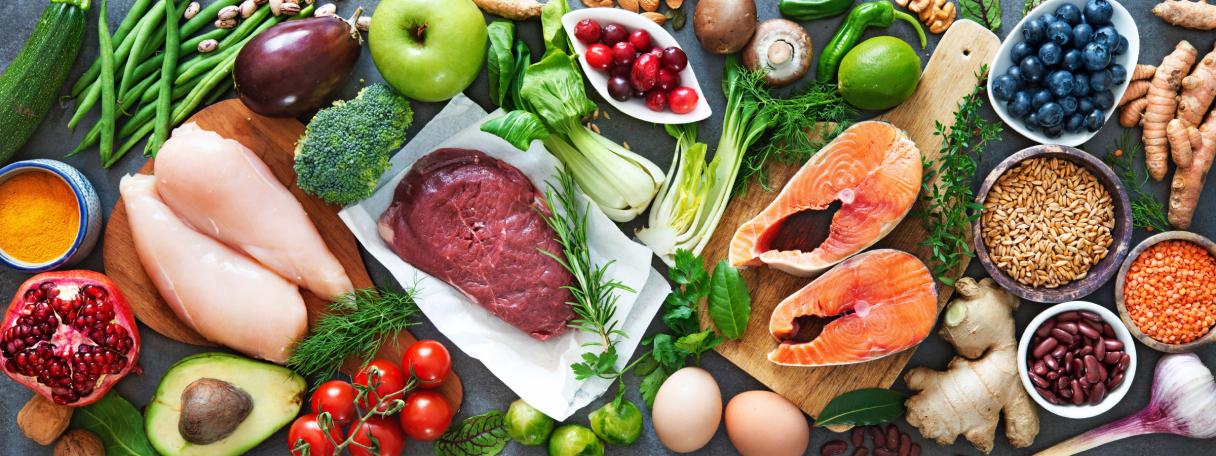
Which Common Foods are Natural Sources of Ubiquinol CoQ10?
Ubiquinol, the active antioxidant form of CoQ10, plays an important role in creating the cellular energy that keeps your heart, lungs, and other organs functioning optimally. Maintaining healthy levels of Ubiquinol supports heart health, promotes the body’s production of cellular energy, and can help prevent damage caused by oxidative stress. As we age, our bodies’ ability to produce Ubiquinol becomes less efficient, making it important to gain Ubiquinol from other sources, such as supplements, to our daily diet. While there are plenty of foods that contain Ubiquinol, you’ll still want to consider taking a Ubiquinol supplement even if you eat a lot of these foods. Still, let's take a closer look at some everyday foods you may be surprised to learn have trace amounts of Ubiquinol CoQ10.
Read More: What Is Ubiquinol and Why Does It Matter?
Adding foods that contain the Ubiquinol form of CoQ10 into your daily diet is a great step towards living a heart-healthy lifestyle, but taking a daily supplement of Ubiquinol is the most efficient way to get an adequate intake. While these foods offer trace amounts of Ubiquinol, it’s important to note that you’d need to eat an immense amount of them to get enough Ubiquinol to match what’s in a typical Ubiquinol softgel capsule! For example, you’d need to consume 60 average-sized avocados to get the same amount of Ubiquinol in a typical supplement (that is, 100 mg per softgel).
Want to learn more about the benefits of Ubiquinol CoQ10 for heart health, cellular energy production, and antioxidant protection? Our Free Buyer’s Guide can answer many of your questions and help you add this heart-healthy nutrient to your daily routine
Ubiquinol In Your Daily Diet
Ubiquinol has been shown to promote heart health, support healthy aging and replenish CoQ10 levels depleted by cholesterol-lowering statin drugs. A typical dose of Ubiquinol in a supplement form is 100 milligrams taken once per day, the amount generally recommended on supplement labels. Technically speaking, it’s possible to get this daily serving without a dietary supplement – but only by eating an immense amount of Ubiquinol-containing foods in a single day. And that’s not something we recommend you do.
Here’s a list of foods that contain Ubiquinol which you can easily add to your healthy, balanced diet. Just don’t count on any foods to replace a Ubiquinol supplement.
Fatty Fish
One of the most well-known Ubiquinol food sources is fatty fish. Salmon, tuna, and sardines are all excellent choices. These fatty fishes are not only a great source of omega-3 fatty acids, which have been shown to support heart health, brain function, and more, but also contain trace amounts of Ubiquinol.
Beef, Pork, and Chicken
If you're a meat-eater, you'll be happy to know that beef, pork, and chicken also contain Ubiquinol. When choosing your meat, try to opt for grass-fed beef and free-range chicken.
Ubiquinol Food Profile: Beef Liver
While not the most popular option on the American dinner table, beef liver is loaded with nutrients. It’s a vitamin B12 jackpot and also contains the Ubiquinol form of CoQ10. However, you’d need to eat more than five pounds of beef liver to get 100 milligrams of Ubiquinol CoQ10. Consuming that much liver in a day is not recommended.
Nuts and Seeds
Snacking on nuts and seeds is another way to get some Ubiquinol from your daily diet. Almonds, peanuts, and sesame seeds are all great choices, as they not only contain Ubiquinol but are a good source of protein, fiber, and healthy fats.
Vegetables
Actually, many vegetables include trace amounts of Ubiquinol. Broccoli, cauliflower, and spinach have varying levels of Ubiquinol and are packed with other essential vitamins and minerals. Other great options include sweet potatoes, carrots, bell peppers, and cabbage. But, before you stock up on vegetables instead of taking your Ubiquinol supplement, let’s dig in.
Ubiquinol Food Profile: Cabbage
People have cultivated cabbage for nearly 2,000 years not only because it’s delicious, but also because it’s thought to have certain healing properties. From slaws to krauts, you may have a few go-to cabbage recipes, but is cabbage a recipe for Ubiquinol supplementation as well? The answer: no. Obtaining 100 milligrams of Ubiquinol from cabbage would require you to eat 133 cups of the leafy vegetable in a single day.
Fruits
Avocado, strawberries, and oranges are all fruits containing trace amounts of Ubiquinol, as well as other nutrients that are great for your immune system and overall health.
ICYMI: 12 Months of Healthy Eating: Colors of the Rainbow
Ubiquinol Food Profile: Oranges
Oranges taste great, are refreshing to snack on, and are packed with essential nutrients such as vitamin C. Well known for their health benefits, it’s hard to argue oranges are anything but nutritionally sensible. That is, unless you’re counting on them to give you a 100 milligram daily serving of Ubiquinol. You’d need to eat 868 oranges in a single day to get enough Ubiquinol to match what’s in a typical Ubiquinol softgel capsule.
Whole Grains
Whole grains like brown rice, quinoa, and oats are a good source of fiber, which can help keep your digestion on track. They also contain trace amounts of Ubiquinol, in addition to other important nutrients like B vitamins and magnesium.
Learn More: Get The Mediterranean Cookbook Here!
Other Common Foods with Ubiquinol
Since you’d need to consume excessive amounts, it can be almost impossible to reach the daily recommended amount of Ubiquinol when eating foods that retain the Ubiquinol form of CoQ10. Additionally, naturally occurring Ubiquinol in foods like chicken converts back into the conventional form of CoQ10 when you cook it.
Take a look at how much food you’d need to eat in order to reach the recommended daily dose of 100 mg of Ubiquinol:
- Peanuts - 3.5 lbs = 100 mg
- Grass Fed Steaks - 20 x 6 oz. Steaks = 100 mg
- Chicken Breasts - 34 x 6 oz. breasts = 100 mg
- Spinach - 50 cups = 100 mg
- Avocados - 60 Avocados = 100mg
- Canola Oil - 100 tbsp. Of Canola Oil = 100 mg
- Sardines - 120 cans of Sardines = 100 mg
- Olive Oil - 133 tbsp of Olive Oil = 100 mg
- Ubiquinol supplement - 1 capsule = 100 mg
Read More: Is Your Healthy Diet Enough To Support A Healthy Lifestyle?
Why Is It Important to Get Enough CoQ10?
Conventional CoQ10, or ubiquinone, is needed by our bodies to provide cellular energy for our heart, vital organs, muscles, and other parts of our body. Our bodies naturally convert ubiquinone into Ubiquinol, which is the active antioxidant form of CoQ10. As we age, our bodies do not convert CoQ10 into Ubiquinol as efficiently as when we are younger, which is why eating a healthy, balanced diet incorporating foods with Ubiquinol is so important. Of course, since we would have to eat 60 avocados a day, or up to 20 grass-fed steaks, it’s important that we take a Ubiquinol supplement in order to reach the recommended daily dose of 100 mg.
For more information about taking a Ubiquinol supplement: Download our beginner’s guide here.
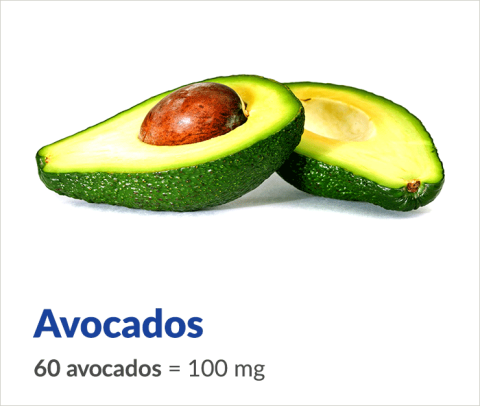
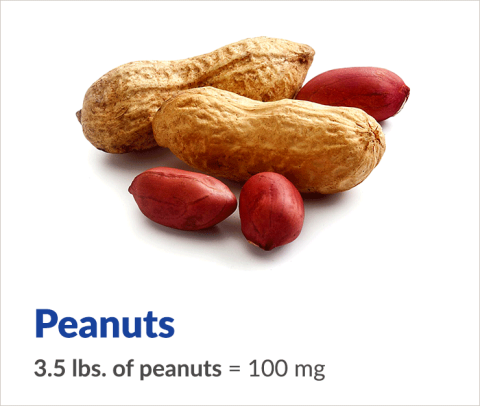
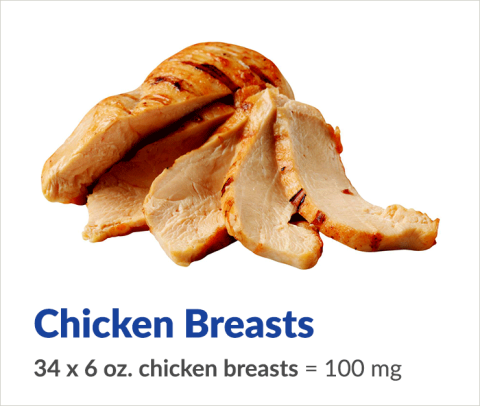
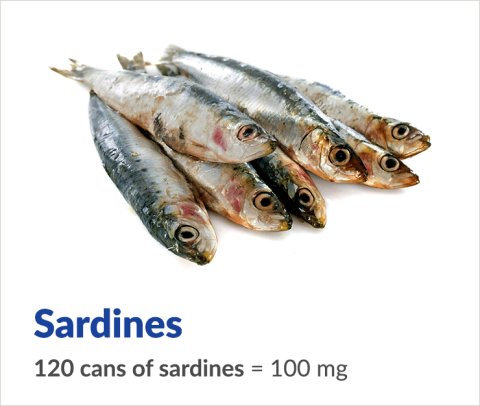
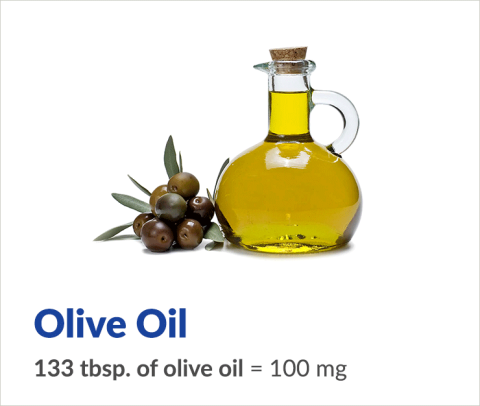
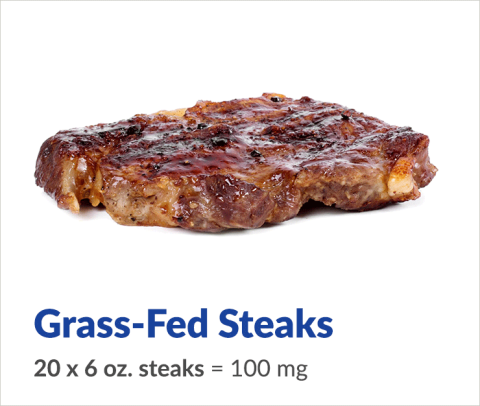
Get the Buyer's Guide to Ubiquinol
Read Our FAQs
Are you taking the right form of CoQ10?
References
- Langsjoen PH, Langsjoen AM. Supplemental ubiquinol in patients with advanced congestive heart failure. Biofactors. 2008;32(1-4):119-28.
- Becker WM and Deamer DW. Energy from Chemical Bonds: The aerobic mode. In: The World of the Cell, 2nd Ed., The Benjamin Cummings Publishing Company, Inc, Redwood City , CA., pps. 275-313.
- Ernster L, Forsmark-Andrée P. Ubiquinol: an endogenous antioxidant in aerobic organisms. Clin Investig. 1993;71(8 Suppl):S60-5.
- Wada H, Goto H, Hagiwara S, Yamamoto Y. Redox status of coenzyme Q10 is associated with chronological age. J Am Geriatr Soc. 2007 Jul;55(7):1141-2.




